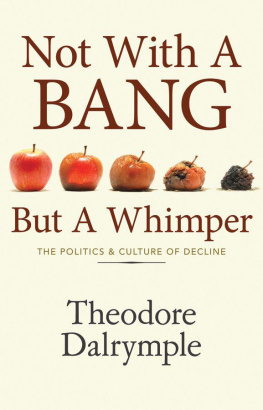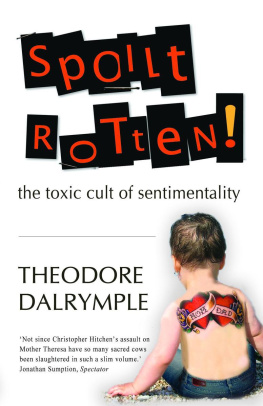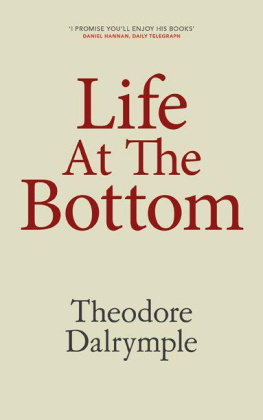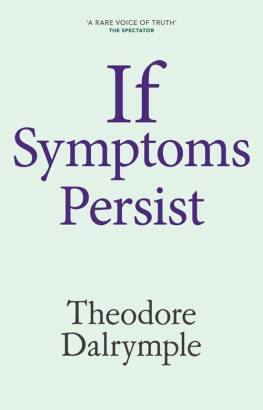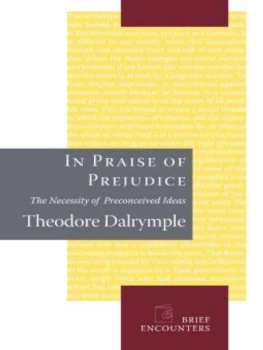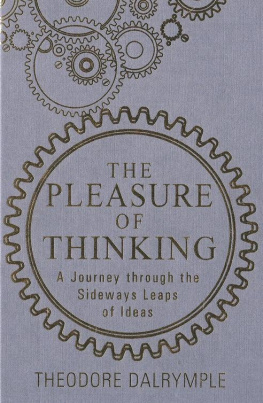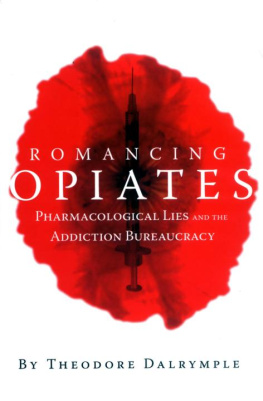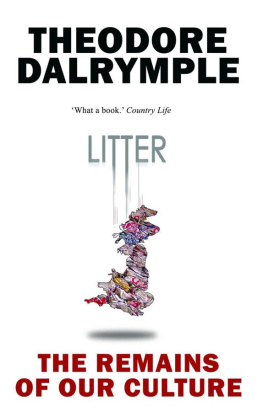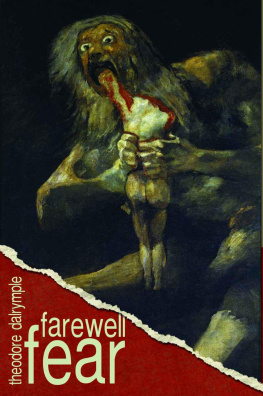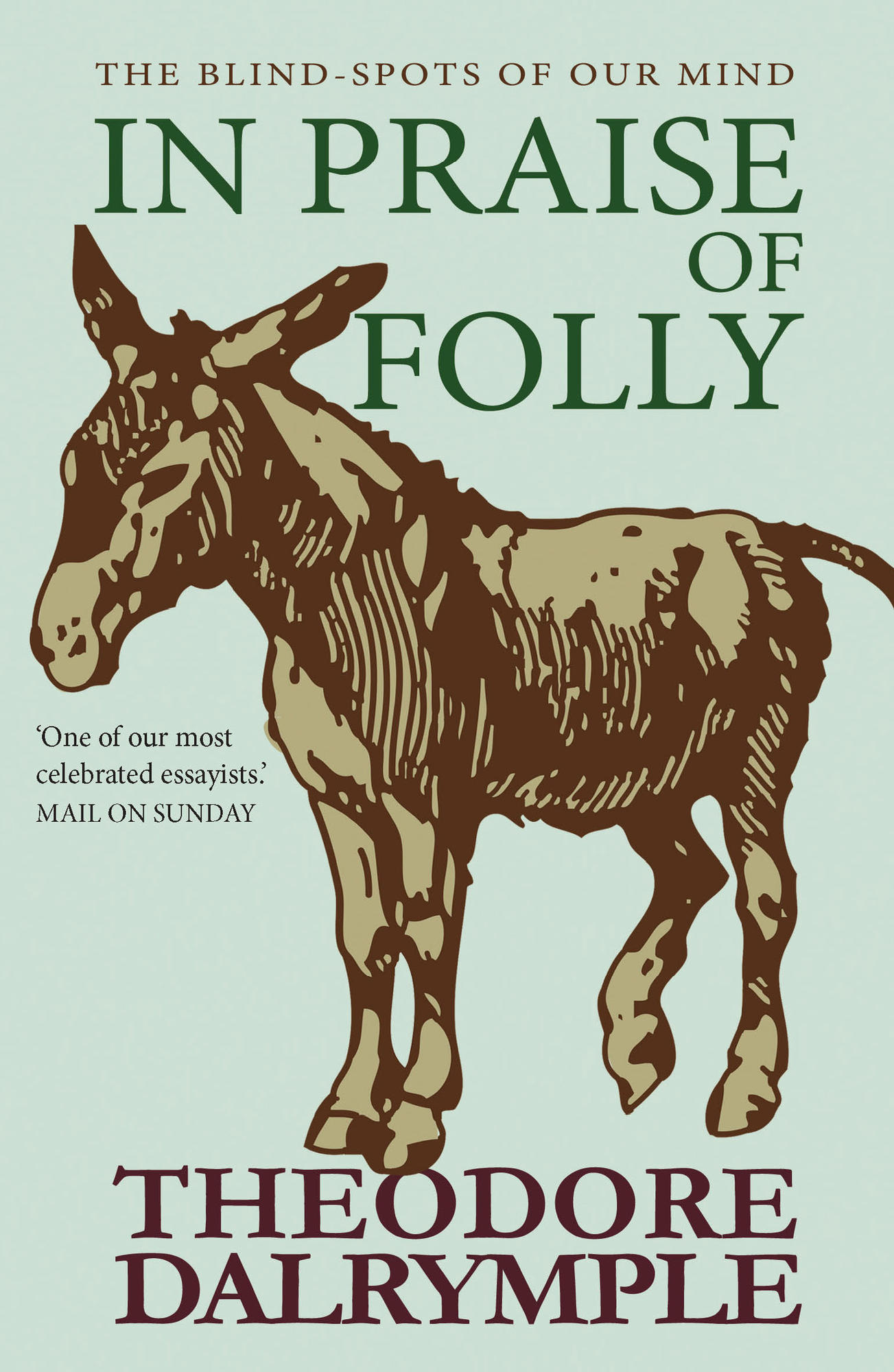Theodore Dalrymple
In Praise of Folly - The Blind-Spots of Our Mind
http://www.gibsonsquare.com
Tryckta bokens ISBN: 9781783341412
E-bokens ISBN: 9781783341429
E-boken konverterad p Booqla
Publicerad av Gibson Square
Alla rttigheter frbehlles 2019 av Gibson Square
Previous Praise
Spoilt Rotten
Not since Christopher Hitchens assault on Mother Theresa have so many sacred cows been slaughtered in such a slim volume. Spectator
Surgical demolition. Guardian
[A] cultural highlight. Observer
Outstanding Toby Young, Mail on Sunday
Witty, always punchy. Scotsman
What make sentimentality so much worse. Sunday Telegraph
Entertaining. Express
Inimitable. Spectator
One of our most celebrated essayists. Mail on Sunday
Litter
What a book. Country Life
A little oasis of sanity and truth. Daily Mail
Very clever. Mail on Sunday
A rare voice of truth. Spectator
Pleasurable tartness. Guardian
Characteristically brilliant. Sunday Times
The Knife Went In
Nobody has observed the fallacies of modern England with a clearer eye, or a more intelligent quill. It would be nice to know that the BBC had heard of him because we could expect to hear him deliver next years Reith Lectures. Sunday Telegraph
A razor-sharp expos of our broken society Both funny and a badly needed corrective to conventional wisdom hugely readable gripping real-life stories tells a deep truth about the sort of society we have become. A future historian, a century hence, will learn more about twenty-first-century Britain from this book than from any official document... Please read it.
Peter Hitchens, Mail on Sunday
Dalrymple is [o]ne of the most interesting men of our times There is nothing in his tale to celebrate, yet in the telling he deserves the commendation of anybody who values human civilisation. The Times
Lucid prose an Orwellian dislike of cant, moral relativism and sloppy thinking black humour. The Oldie
For anyone interested in the real world of ciminals and the criminal mind ... the follies of the bureaucracy that envelops our penal system. The blackest of black humour the best of humanity. Daily Mail
Dedication
For Agns
1 Everywhere is Interesting: Ive been to England
On a trip to hard-living Dylan Thomass hometown Laugharne in South-West Wales, I wanted to consider the folly of eminent people. My wife, who is also a psychiatrist, travelled with me from Bridgnorth, Shropshire, and Laugharne is on the estuary of the Tawe, Carmarthenshire. Dylan Thomas lived there at the idyllic Boathouse, perched on the river bank, for four years before his death. In another life, I would like to have been a bohemian myself and I always visit the pretty churchyard where he is buried. Serendipitously, the journey also passes by a number of second-hand bookshops, another obsession of mine.
My work has been, and still is, my greatest pleasure and there is no greater good fortune in life than this, perhaps. But it does mean that other kinds of enjoyment seem both unimportant to me and an interruption. We decided nonetheless to take a couple of days off and the fact that our roof had recently leaked and an old garden wall nearly collapsed may well have encouraged us. We chose the destination both for sentimental reasons and because we knew that there are few more beautiful drives in the country. Within a few hundred yards of our door, we are in the lovely Shropshire countryside; and the beauty continues with scarcely a break for a hundred and forty miles.
The sentimental reason for the trip was that we had already spent several months in Carmarthenshire. After her hospital consultancy, my wife spent a few months of each year occupying locum posts, and she had twice occupied them in Carmarthen. I always accompanied her and made what life I could wherever she went. I did not find this at all difficult, for the one lesson I have distilled from life is that everywhere is interesting. And South-West Wales is far from the least interesting place in the world.
Generally we stayed in hospital accommodation and sometimes it was dismalin Yeovil, pronounced You-evil by the lady in our satnav, there were even bedbugs. But, though it was not of the standard of comfort or grace to which we had become accustomed, it was strangely liberating. In the first place, it took us back in time to when we were students and this in itself was pleasing. But in the second, it simplified life greatly by depriving us almost completely of household responsibilities. If something went wrong, there was someone on hand to fix it at no cost or irritation to ourselves. There was even someone to make our beds and clean our rooms. The kitchens were generally communal and we seldom availed ourselves of them, eating in restaurants instead. I, at any rate, felt free as a bird.
The first time my wife was employed in Carmarthen we stayed in the town itself, in a house on the grounds of the former mental hospital, now used for NHS administration after the original patients had moved out. But between her first and second period of employment in Carmarthen the house had been sold off and so we had to stay in hospital accommodation in Llanelli, a town of ill-repute.
Coal and steel towns are never pretty, but there is something peculiarly dispiriting about a steel town once the coal and steel have departed, as they now have from Llanelli. To the casual observer, the towns main economic activity of late seems to be the administration of unemployment and the recycling of government appropriations. In so far as there is any private economic activity at all, it is the expenditure of those subventions in the kind of chain stores that disfigure every British shopping district. Appearances, however, may be deceiving.
Dispiriting as Llanelli appeared to be at first sight, I was happy there (as, I think, I could be almost anywhere). I liked the people: they had more than the usual small-town warmth and friendliness. At bus-stops they would strike up a conversation with me as if it were the most natural thing to do, rather than an intrusion on privacy. They seemed interested in me, perhaps because not many strangers take buses in Llanelli. When they discovered that I was a doctor they asked my medical advice, which was flattering. To judge from overheard conversations, illness, doctors and hospitals were subjects of even greater interest to them than for most of mankind.
Three encounters of our time in Llanelli have stuck in my mind. At one of the bus stops I used to meet a man, a widower, in his middle seventies. He was going into town for his regular lunchtime pint of beer and he was always immaculately turned out for the event. He wore a blazer, grey trousers and highly-polished black shoes. His shirt was starched white, perfectly ironed, and he wore an elegant blue-and-red striped tie. He was splendid to behold, especially in the general sartorial slovenliness and bad taste that prevailed in Llanelli.
He had been a coal miner all his life, and his retirement coincided with the closure of the last coal mine. He seemed to have escaped entirely the occupational diseases of coal miners, and though to most of us the prospect of working down a pit all our life would be appalling, he had enjoyed his work and said he would not have done anything else.
His smartness of dress was not vanity but practical philosophy. Self-respect (he told me) required that he looked smart when he was in public. He dressed not for himself but for others, and it would be morally wrong to be an eyesore for them. It was therefore the reverse of egotism: rather, his attention to dress was a social virtue. It could not, as a widower, have been easy for himI did not enquire what help, if any, he received.


